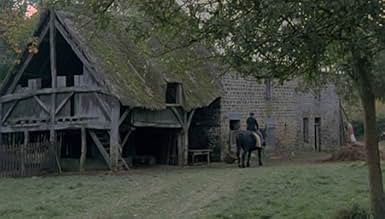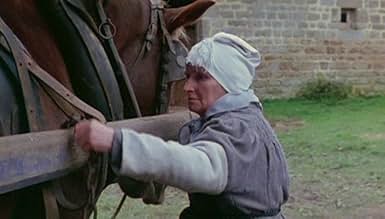Moi, Pierre Rivière, ayant égorgé ma mère, ma soeur et mon frère...
- 1976
- 2h 10m
Based on documents compiled by leading French philosopher Michel Foucault, this unique and original film charts the gruesome events which took place in a Normandy village in 1835, when a you... Read allBased on documents compiled by leading French philosopher Michel Foucault, this unique and original film charts the gruesome events which took place in a Normandy village in 1835, when a young man, Pierre Rivière, murdered his mother, sister and brother before fleeing to the coun... Read allBased on documents compiled by leading French philosopher Michel Foucault, this unique and original film charts the gruesome events which took place in a Normandy village in 1835, when a young man, Pierre Rivière, murdered his mother, sister and brother before fleeing to the countryside. With a cast made up of real-life villagers from the area where the events took pl... Read all
- Awards
- 1 win total
Featured reviews
The cast, mostly villagers found in the places where the events had taken place 150 years before and reenacting the gestures of their ancestors, is quite static but creates an interesting atmosphere of hyper-realism. Thanks to them and to the careful narration, René Allio accomplishes the unique feat to offer at the same time an (almost) ethnographic document, an historical film, and an inquiry into a psychopathologic case. His approach may seem naive at times, but the film is overall a winning affair, and is widely different from any other period picture set in similar time and place.
Highlights of Moi, Pierre Rivière are the striking first sequence, where we discover with a slow pan the bodies of the family and the first interrogation of the stunned murderer. The cinematography, by Nurith Aviv, is exemplary, and Allio appears here as one of the most daring and interesting filmmaker of the seventies.
Newcomer Claude Hébert plays the title role with perfection, as there are detailed descriptions about his physicality and behavior, as an outcast with serious mental problems, barely connecting with other people and living in his own inner world that was slowly affected by the care he had for his father, a farmer mistreated by his own demanding wife in a loveless marriage where she tormented the life out of him. The boy moves to bizarre antics, hurting animals and once he had a fixed idea that the mother and her sister (who was also against the dad) needed to be eliminated, after biblical and mythical reasonings,he goes after the intent (the little brother was a case of wrong place, wrong time).
The view from afar benefits the film adaptation rather than having Pierre being the narrator of his own tragedy as it would alienate audiences in not believing in the young man's intelligence (for someone who had little knowledge of words and expressions, he composed a fine piece to be read and it's the most important parts of Foucault's gathering, an almost unashamed confession). And the challenge is destined for viewers to figure out if he's acting out of madness, if there's a sole (valid?) purpose for the murders and how the legal system, doctors, lawyers and jurors saw the case when it came the time for decide between capital punishment, life in prison or rehabilitate through a mental institution. It doesn't stay focused much on that latter part (as it goes in the novel, which becomes a repetitive bore at the end), but it should as it'd give a fascinating view on how this scenario, the French modification of laws related to patri-matricide at that time, and how society reacted to those horrific crimes.
And it's insanely bizarre how much the thinking audiences will be inclined to favor much of Pierre's actions, either reading his story or watching the film. The mother is a devil incarnate with countless mood swings, completely erratic behavior and unstoppable, as there were always times when she brought her husband to court and she always got favored over the poor man. Not that we defend the murderer and his barbarian act, but it's one of those things that it's hard to defend a poor excuse of a wife and mother. Plus, his arguments of defense and protection of his father, through the use of biblical and historical references is the kind of thing that could quiet any unwise prosecutor in charge of the accusation.
Interesting and believable performances, wiht a cast formed mostly by locals of the actual place of the homicide happened 100 years earlier. By today's standards it's somewhat tame when it comes to its actual title and never exploitative as a Hollywood film would be, but it serves a higher purpose in documenting a classic criminal case in France, how it was dealt, and the many inner questionings that revolved on people's minds about Pierre's insanity or his monomania. It's all about sorrow and no one wins. 9/10.
"Moi Pierre Rivière " could be subtitled "anatomy of a murder".It's a true story which happened in the rural Normandie in the nineteenth century but anyway ,those peasants ,anyone who has read Maupassant's short stories or Zola's "La Terre" already knew them.
Pierre Rivière cut the throat of his mother, his brother and his sister and is waiting for his trial.In the meanwhile,he writes a manuscript where he tells the whole story.Witnesses appear too and tell the story as they've seen it.
Allio's treatment is anything but derivative.Sometimes Bressonesque (his major influence) with his use of non-professionals actors for his peasants ,and their neuter voices ,with something borrowed from Truffaut's "L'Enfant Sauvage" (1970) -screenplay entirely based on historical documents-.
Pierre is a complex character,whose behavior thoroughly eludes the viewer.He sees his father,a crude uneducated meek man humiliated and harassed by a shrew of a mother,who always lets him down after she's taken everything she can steal.Probably under an over-possessive mother's thumb,this woman does not want to share her husband's home.
Pierre's report is stunning: the style is perfect,using a very refined French,most of the verbs in the past historic(Passé Simple) a tense which increases the distance between Pierre and the events he depicts.He even uses the subjunctive imperfect,a tense only an educated person can know.Pierre is an enigma to the world:how a boy who was nurtured in such a demeaning milieu can he be able to write like this?He bought a book ,some kind of mini-encyclopedia where he found subjects (Napoleon,Indians) which fueled his misogyny.
Is he a lunatic? Certainly not in the way the doctor thinks he is during the trial.The fact Pierre refers to Abraham and the "God told me to do that" thing are not surprising,coming from a country boy,at a time when religion verged on superstition .I think that Pierre cannot stand his father's passiveness.He needs an outlet: crucifying a frog or squashing a bird between two stones are first attempts at a murder.Hate ,anger and frustration are in him and won't live him alone.One day animals are not enough:the saucy song (which we can hear twice) sung by the neighbor about his dad ,it's this which sparks off the incident or should I say the tragedy.
They are three dead bodies in the kitchen,lying in a pool of their blood. A boy is running across the country thinking "what have I done?" and putting his trust in God,cause he gave his life in sacrifice so the others (his father,his grandmother ,his other brothers) could survive. He still do not know whether he'll be sentenced to death when he's arrested,but he knows that he is dead anyway.
This is a slow moving movie,not exactly an accessible one;but it's a demanding one,and one that will reward you if you give it a chance.
Beginning at a snail's pace, the film follows Riviere's (Claude Hebert) parents' increasingly unstable marriage. His mother (Jacqueline Milliere) seems to be mentally unstable, and intent on driving her husband (Joseph Leportier) into poverty and ruin. The two live apart, with Pierre favouring his father as opposed to the other children, who seem to be unaware of the huge debts that Mme. Riviere is building up. Pierre watches on silently as this takes place, and we are informed via voice-over that wishes he could somehow release his long-suffering father of his mother.
The film is filmed almost as a documentary, with naturalistic and cold exchanges between the majority of the characters. It even has various members of the village giving their account of Pierre almost to camera while their name and occupation appears below them. It works very well, and you get a real feel to the case and the attitudes of the time. It is made all the more realistic due to the fact that director Allio hired non-professional actors to play these roles who really were farmers. They talk, act and work like farmers, and the feeling of authenticity surrounds the film. I don't know if it is intentional or not, but it has the feeling of a Robert Bresson film, who famously called his actors 'models', and preferred them to act as little as possible. If it was intentional, then it is a bold and effective move, as it gives the feeling of mundanity to the farmers and their lives.
As Pierre Riviere, Claude Hebert is outstanding. His large nose, big eyes and tight mouth embodies that of shy awkwardness with a shade of uncertainty lying beneath the exterior. He spends the majority of the film lurking in the background, shuffling between feet and giving sideways glances as if trying to avoid eye contact. I genuinely believed that he would be capable of murder. The scene where he forces a horse and carriage over a large manure pile, tipping the carriage and almost killing the horse, causing Riviere to quietly laugh to myself, sent genuine chills down my spine. He is one of those strange kids at school that you would try to avoid.
But it's not as black-and-white as I think I'm making it out to be. Riviere is not just a strange psychopath. The film poses the same questions that were posed by the psychological investigators assigned to his case back in 1836. Riviere could be a victim of social alienation. Or perhaps it could have been a moment of insanity brought on by witnessing years of torture set by his mother. Or it is suggested that Riviere could have built up a misogynist mindset by taking in various pieces of literature, and because of his overall fear of women. It will certainly provoke discussion, and probably stay with you for a very long time. Absolutely magnificent.
www.the-wrath-of-blog.blogspot.com
Did you know
- TriviaMost of the actors that appear in the movie are villagers without acting experience, from the same region were the actual events happened, except from the judges and doctors; the director did this in order to preserve that idea on how the villagers didn't have any education and were isolated from the society back then.
- GoofsAll entries contain spoilers
- ConnectionsFeatured in Back to Normandy (2007)
Details
- Release date
- Country of origin
- Language
- Also known as
- I, Pierre Rivière, Having Slaughtered My Mother, Sister and Brother...
- Filming locations
- Caen, Calvados, France(Palace of Justice stairs)
- Production companies
- See more company credits at IMDbPro
- Runtime2 hours 10 minutes
Contribute to this page


















